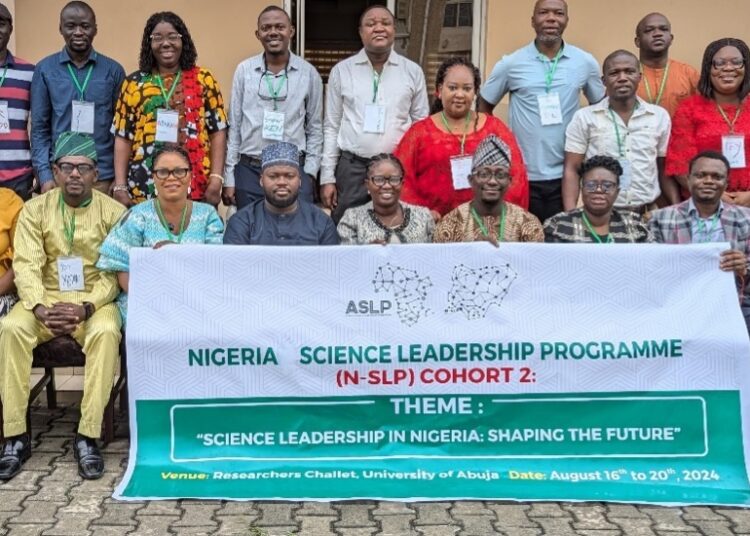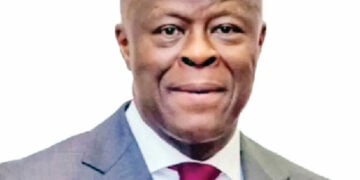The Nigerian Science Leadership Program (NSLP) is reinventing the concept of leadership through its philosophies and ideologies which harp on ‘doing research in systematic ways.’ NSLP exists to establish the nexus between science and leadership, and it has so far done massive exploit in this wise. As a way of driving its core aims and objectives, the NSLP organizes trainings and workshops for mid-career and senior academic stakeholders during which they are exposed to systematic guidelines on how to be effective leaders in their chosen fields of endeavour and in their daily affairs.
During the training of its second cohort in Abuja which happened between the 17th and 19th of August, 2024, twenty seven fellows, comprising of professors, doctors and senior academic eggheads, were assembled at the Academic Staff Union of Universities (ASUU) secretariat to be imparted with the tool sets and skill sets needed to do exploits in their academic endeavours and in their general undertakings. The fellows were selected through a highly competitive screening process which saw the selection of twenty seven out of the over 200 applicants who indicated interest in the training.
Prior to the training, many of the fellows only had basic or peripheral knowledge of the concepts of science, research and leadership. But after they had been exposed to other dimensions of the subject matter and how science, leadership and research are interwoven in the academic sphere, their perspectives on the said subjects changed, and they came to further appreciate the essence of science and leadership and how it can influence their career growth and advancement.
In a bid to establish the connection between science and leadership, Professor Temitope Olomola of the Chemistry department at the Obafemi Awolowo University, Ile-Ife who was a facilitator at the workshop, averred that ‘Science’ in NSLP’s context, is not the hard sciences such as mathematics and physics that are known to everyone, but the philosophical base for conducting research in a systematic way. He further stated that the concept of science leadership in a broader sense, incorporates the ideas of accountability, inter-dependence, and transparency, especially as they relate to the academia.
He emphasized that the essence of research in science leadership is essentially to ensure that stakeholders in the academic sphere are equipped with the requisite tool sets and skill sets for initiating ground-breaking reforms in the academia. He talked about the importance of preparing people for leadership so that when they are saddled with the responsibility of leading, they don’t complain about the existing problems but work out solutions to such problems.
He further stated that the NSLP’s modus operandi is guided by the ‘Collective Leadership Module,’ a systematic arrangement which ensures that every member of a team is included in the scheme of things, so that a robust collaboration is guaranteed with everyone contributing their quota to the achieving of a set goal.
It is very important to state that the NSLP is not isolated as it is an offshoot of the African Science Leadership Program (ASLP) which came into being 10 years ago in South Africa. The facilitators who have successively trained the NSLP fellows in Nigeria were all trained in South Africa, under the auspices of the Future Africa Centre at the University of Pretoria.
The training of fellows was initially being done at South Africa, but the cost of conveying all the selected applicants to the venue of the training coupled with the attendant cost of accommodation and other costs, prompted the NSLP to device a means of conducting the training here in Nigeria. The very first cohort of the Nigerian-trained fellows was trained last year in Ibadan, while this year’s cohort had the privilege of enjoying the luxury of Abuja, in Nigeria’s Federal Capital Territory.
Talking about the theme for this year’s workshop which is “Science Leadership In Nigeria: Shaping The Future,” Oluwatosin Leshi, a facilitator and a member of the planning committee for this year’s training, stated that the theme aptly captures the focal point of NSLP’s message which is to drive the reinvention of leadership in all spheres of Nigeria’s national life. He further highlighted the impactful achievements that the organization has recorded since its inception in Nigeria and projected the futuristic deliverables that are stocked up in the NSLP’s scheme of things.
And while still discussing the expectations of NSLP for its fellows, Leshi expressed optimism that soon enough, many of the fellows who have passed through the refining fires of NSLP’s tutelage will ascend to the top of their respective careers and occupy sensitive leadership positions from where they will exert the greatest positive influence.
– Nwachukwu, a developmental and human-interest journalist writes from Abuja
Now, the importance of leadership in the human sphere of endeavour can never be overemphasized, hence leadership-focused organizations will continue to be relevant and hold sway. But even as much as there are a plethora of leadership-focused organizations, NSLP still stands out and stands tall because of its approach to leadership. One of the unique ideologies being propagated by the NSLP and for which it has garnered renown is the concept of “Creative Problem Solving” or CPS as it is often called.
The CPS approach to leadership implies that a leader can most effectively solve problems by bringing together a wide range of ideas from which he selects the ones most suited for the problem he is trying to solve. The CPS theory was properly analyzed by Engineer Doctor Michael Ayodele Omodara from the Nigerian Stored Products Research Institute who was also a facilitator at the workshop, and he did his analysis with the precision characteristic of a master.
The fellows on their own part were dazzled by the uniqueness and ‘uncommonness’ of the knowledge they were exposed to at the training. Most remarkable of the testimonies shared by the fellows was that of Dr. Suleiman Inuwa Mohammed, an associate professor at the Federal University, Dutse, Jigawa State, who expressed profound gratitude for being picked to be part of the 2024 cohort. He however expressed deep concerns about the non-disposal of his fellow northerners to attending trainings such as the NSLP’s which help to prepare people for the excellent life. He vowed to help spread word about NSLP’s regenerative impact and to also champion a sensitization campaign towards getting more northerners to be involved in the NSLP’s business.
NSLP’s spectrum of selection did well to cover participants from all regions of Nigeria such that the respective ethnic nationalities of the country were duly represented. Although the South-West, South-East, South-South and the Northern regions were all represented at the training, there were however concerns that the North did not have a proper representation. While the combined representatives of the Southern region took the day in terms of their numbers, the North was however represented by only two individuals out of the 25 fellows that were part of the 2024 cohort. It is the hope of the NSLP that going forward, the North will be better represented.
Nwachukwu, a developmental and human-interest journalist writes from Abuja





